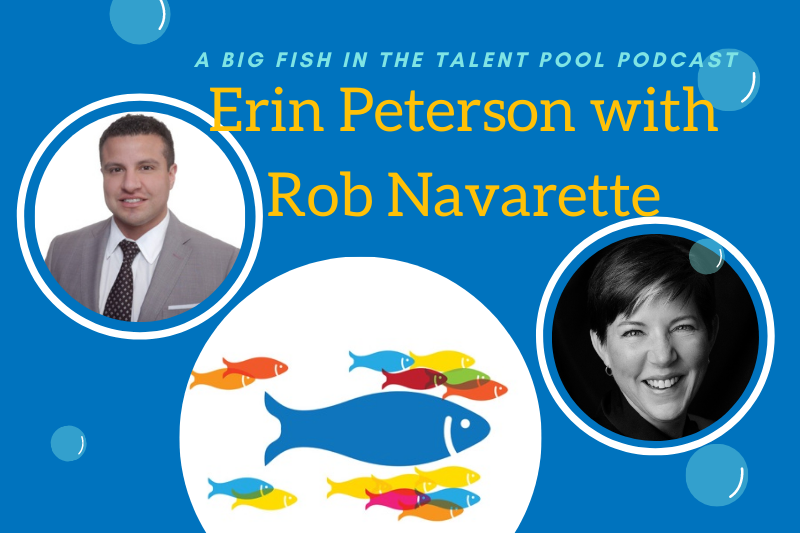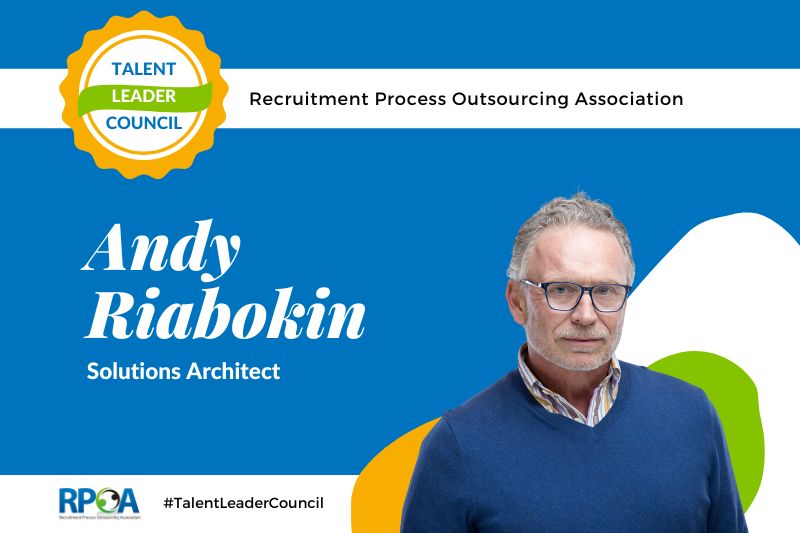Standing out in a crowded market isn’t always about having a completely unique product or service to sell. Take RPO, for example. All RPOs work with their clients to forecast staffing needs, drive candidate exposure to jobs and employer brand, source and engage talent, and provide candidate assessments and care. Yet, the best talent acquisition leaders have found ways to differentiate themselves and become experts in what they do.
There are many paths to get to differentiation, but what it all boils down to is this: It’s not how unique your approach is, it’s how unique people think your approach is. And according to Rob Navarette, how people view you—and your approach—depends a lot on how you see yourself.
Navarette, the Director and Head of Recruitment at Willis Towers Watson NA in Toronto, was a recent guest on Erin McDermott Peterson’s popular podcast, “Big Fish in the Talent Pool.” In an episode titled “Differentiated Leadership,” Navarette talks candidly about his personal and professional experiences and growth as an RPO and talent acquisition leader.
The Many Faces of Differentiation
Differentiation is a different journey for everyone. Navarette says he found his differentiator as a leader through cross-cultural training. As an LGBT+ Latino Canadian, he says learning to adapt to different ways of delivering service was key. “I think people generally see Canadians as ‘nice people,’” he says and on some level, that can be a bias.
It took some years for Navarette to get there, but when he learned to become more comfortable in his own skin, he was finally free to be his authentic self. People respond to authenticity and now, he says, he feels comfortable. He credits his current success to embracing who he is as a person. “I feel supported, I can share my ideas, and express strong opinions, but don’t have to worry about being someone else.” When he finally “took off the shield” and accepted himself as different, his outlook and approach changed.
Another key differentiator? “In our business, I don’t see too many things as mistakes, I see them as learning opportunities,” Navarette says. When forming solutions for clients he typically comes up with three or more options. One doesn’t work? Go on to the next! He uses data to make strategic decisions along the way which, in his view, lessen the impact of “mistakes.” He’s also learned not to dwell on the maybes, the woulda, coulda, shoulda mentality that some people get hung up on. If the outcome is good, that’s a success, even if some elements could have been done differently.
Leaning on Flexibility During COVID-19
It’s hard to have an RPO-related discussion today without talking about the impact of COVID-19. “Like many companies, our hiring demand has decreased, about 80% overall in the experienced side,” Navarette says. The seasonal worker sector is stronger. Campus recruiting comes with its own unique challenges, particularly in how to talk to candidates. Everything is done virtually now and start dates are fluid.
Flexibility and the ability to pivot are the two key traits setting forward-looking RPOs apart.
The Relative Values and Risks of Partnering with an RPO
For Navarette a good RPO is a strategic partner who needs to have not only a strong relationship with the client but a deep understanding of the client’s business itself. Good RPOs understand that recruitment has changed over the years. Today’s RPO should be able to:
- Solve things an internal team cannot.
- Leverage economies of scale, introducing innovative tools and new technologies, insights, reporting, and other things internal teams often only dream about.
If an RPO isn’t perceived as a strategic partner with a seat at the table, then all those tools they possess or have access to go to waste and the partnership is not optimized. The result? Difficulty “pivoting at the 11th hour.”
What Makes a Great Recruiter
Of course, the ability to source and recruit is a given. The other top three criteria Navarette looks for include:
- Creativity. Tech tools are great, but what happens when tech fails? How creative are we; how distinctive can we be from the competition. Is tech your only tool? “I hope that it isn’t,” says Navarette. Sometimes you have to go back to traditional methods. An ideal RPO is someone who can leverage new tools but can be creative when needed.
- Perseverance. What differentiates people is being willing and able to go the extra mile. The “three-contacts-and move-on approach doesn’t always work or isn’t always the best choice” Navarrete believes. It can be tempting to call it a day, but sometimes you hit paydirt on the seventh or eighth try.
- Experience/recognition of the experiential environment. Proving an excellent candidate experience is important, but the same goes for a great hiring manager experience. A good RPO leverages information to give hiring managers a better sense of what the talent supply chain looks like. They also offer insights on why introducing diversity is important. It’s a consultative approach that challenges hiring managers to look more openly and widely.
In the end, it’s about cultivating empathy by putting yourself in the shoes of a candidate and hiring manager. When you do, the to-do list gets pretty clear, and you discover most of it has to do with communications.
Final Thoughts
For those who seek out Navarette’s advice on how to be a TA leader, he offers this: “Be open, be curious, have loosely held strong opinions, and be open to listening to others. Don’t be afraid to be distinctive. Stop assuming how others want you to operate. Challenge your personal fears. And recognize the value your diversity brings to the table and how it benefits clients and candidates alike. Being distinctive, says Navarette, “makes you stand out.”
Finally, even when you have successes under your belt, understand “you don’t know everything.” No matter how far you go, it’s important to “listen, to adapt, to be curious, and to leverage the strengths of others," Navarette says. Be willing to be challenged, for those thought-provoking moments allow you to become a better recruiter and TA leader.















